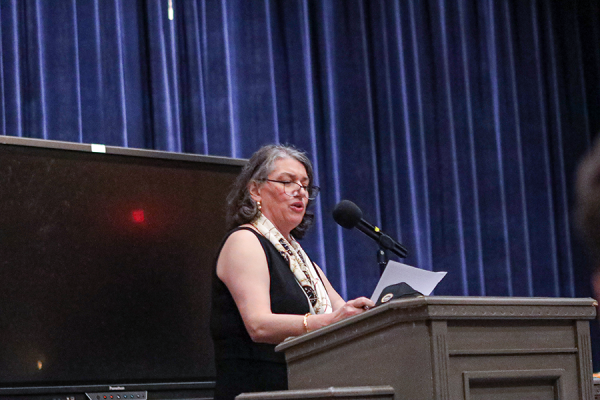Honor Council Disbanded in Controversial Decision
30-year tradition comes to a close
April 16, 2015
In a decision from ACPS administration, the WAHS Honor Council has been stripped of its status as a peer disciplinary jury. An official public announcement from Assistant Superintendent Matt Haas was released to the Western community on Friday, April 3. The letter stated that the disciplinary procedures of the Honor Council risk violating the Federal Educational Rights and Privacy Act (FERPA) which protects access to information in students’ educational records.
Contrary to popular belief, it is the particular status of the Honor Council as a disciplinary body that has been challenged rather than the entity itself. According to Albemarle County Schools Spokesperson Phil Giaramita, “it has been changes in the law, particularly the privacy law, that drove the decision to reexamine the Honor Council. So the issue was a legal one, not a performance one.”
Though this decision was released to the public on April 3, word had already spread among students. “Honor Council members were supposed to have a meeting on April 1st, the Wednesday before,” senior and Honor Council chair Chance Masloff explained. “But we all got an email that it [the meeting] was cancelled, and later I was told that Ms. Gardner [a faculty sponsor of the Honor Council] only wanted to see me. That’s when I first found out about it, and I had to spread the word to all the other Honor Council members because we aren’t allowed to meet formally anymore.”
The Honor Council had existed at Western for over thirty years prior to the county’s verdict. It worked as an entity to hear cases involving cheating and academic lies, where accused students had the option of either pleading guilty to administration or reporting to the Honor Council. At the Honor Council, students had the option of earning probation for their offense if they plead guilty.
The council is no longer hearing cases because of the county’s decision. However, WAHS staff have met and determined a new disciplinary procedure for this year, available online here. This new policy states that if a student pleads guilty, they will receive a punishment decided on by the administrator, including a certain amount of lunch detention and a guided essay. However, after these actions are completed, the administrator is allowed to give probation for a student.
If a student pleads not guilty to an honor offense, instead of coming before the Honor Council the student will present their case to the three associate principals, and they will vote to determine a verdict. Students found not guilty will have their grade restored, while guilty students will have to complete punishment. Students who are found guilty this way are still able to earn probation, and the administrators can make recommendations on the grade to give the student.
Opinions about the Honor Council and these recent decisions have been controversial. A group of students, including some former Honor Council members, wore blue on April 13 in protest of the county’s decision. According to senior and former Honor Council member Tim Dodson (who is also a co-Editor-in-Chief for The Western Hemisphere), who has been spearheading the effort to restore the Honor Council, the day was chosen partly because April 13 is Thomas Jefferson’s birthday. “It seemed appropriate to have this on his birthday, because Jefferson was so influential at UVA, and our honor council is modeled off of the one used there. This whole day really stood to show support for open-decision making and the community of trust we have here at Western because of our honor council.”
Dodson feels that the Honor Council’s status has been so controversial because of the way the county made the decision to disband it: “You can’t change a thirty-year standing tradition overnight like that, but that’s what the county did. I think the way the decision was made, without the input of students, teachers, and parents, sets a poor precedence for decisions between the schools and the county.”
Fellow Honor Council member Patrick Andrews (who is also a co-Editor-in-Chief at The Western Hemisphere) agrees. “It’s been argued that it wasn’t in the best interest for the county to delay this decision with this kind of discussion, but it’s important to have that to keep maintaining a cohesive community with mutual trust. If the county hadn’t skipped this discussion, they could have worked with us in the Honor Council in order to comply with more conservative legal standards. But the way the county made this decision, it’s like they just decided they knew better, and that we just have to accept no matter what.”
Honor Council members, along with other interested students, met April 22 in order to discuss possible reforms to the Honor Council to work with the county’s decision. As the county had stated one of their issues with the council is that Western had a disciplinary system entirely different from the other area high schools, these students are now reaching out to Albemarle, Monticello, and Murray to gauge interest in implementing an honor council at the other county schools. Additionally, a student forum is being held on April 29 to hear opinions on the Honor Council and possible changes to its policies.
“I think it’s really important to have the Honor Council so that students are able to own up to their actions and learn from them,” Masloff said. “That’s why we’re really trying to figure out a way we can still have it.”















